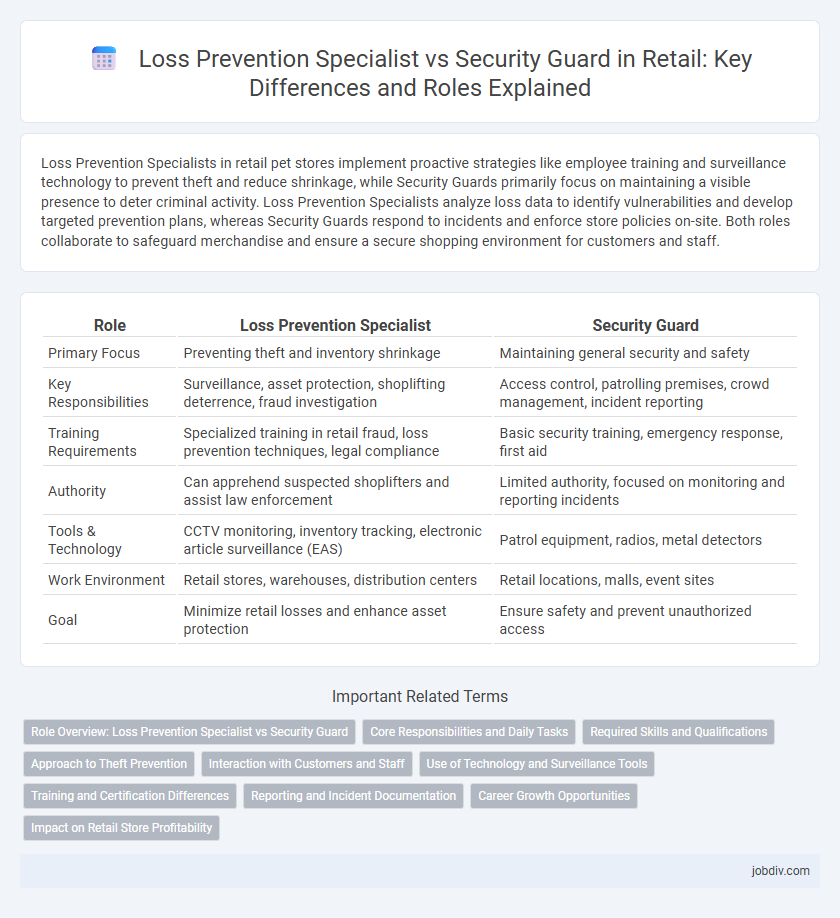Loss Prevention Specialists in retail pet stores implement proactive strategies like employee training and surveillance technology to prevent theft and reduce shrinkage, while Security Guards primarily focus on maintaining a visible presence to deter criminal activity. Loss Prevention Specialists analyze loss data to identify vulnerabilities and develop targeted prevention plans, whereas Security Guards respond to incidents and enforce store policies on-site. Both roles collaborate to safeguard merchandise and ensure a secure shopping environment for customers and staff.
Table of Comparison
| Role | Loss Prevention Specialist | Security Guard |
|---|---|---|
| Primary Focus | Preventing theft and inventory shrinkage | Maintaining general security and safety |
| Key Responsibilities | Surveillance, asset protection, shoplifting deterrence, fraud investigation | Access control, patrolling premises, crowd management, incident reporting |
| Training Requirements | Specialized training in retail fraud, loss prevention techniques, legal compliance | Basic security training, emergency response, first aid |
| Authority | Can apprehend suspected shoplifters and assist law enforcement | Limited authority, focused on monitoring and reporting incidents |
| Tools & Technology | CCTV monitoring, inventory tracking, electronic article surveillance (EAS) | Patrol equipment, radios, metal detectors |
| Work Environment | Retail stores, warehouses, distribution centers | Retail locations, malls, event sites |
| Goal | Minimize retail losses and enhance asset protection | Ensure safety and prevent unauthorized access |
Role Overview: Loss Prevention Specialist vs Security Guard
A Loss Prevention Specialist focuses on identifying and mitigating theft risks through surveillance, data analysis, and employee training within retail environments. Security Guards primarily maintain physical security by monitoring premises, controlling access, and responding to incidents to ensure safety. Both roles are crucial for protecting retail assets but differ in their strategic and operational approaches to loss prevention.
Core Responsibilities and Daily Tasks
Loss Prevention Specialists analyze sales data and surveillance footage to identify and prevent theft while developing strategies to minimize shrinkage in retail environments. Security Guards maintain a visible presence, conduct regular patrols, and respond to alarms or disturbances, focusing on deterring criminal activity and ensuring customer and staff safety. Both roles require strong observation skills, but Loss Prevention Specialists emphasize investigative work and reporting, whereas Security Guards prioritize immediate physical security and emergency response.
Required Skills and Qualifications
Loss Prevention Specialists require expertise in inventory management, data analysis, and fraud detection, often holding certifications like Certified Protection Professional (CPP) or Loss Prevention Certified (LPC). Security Guards prioritize physical security skills, such as surveillance, emergency response, and crowd control, typically needing licensing or state-mandated training. Both roles demand strong communication and observation skills, but Loss Prevention Specialists emphasize analytical abilities and retail industry knowledge.
Approach to Theft Prevention
Loss Prevention Specialists employ proactive strategies such as data analysis, employee training, and surveillance technology to identify and prevent theft before it occurs. Security Guards primarily focus on visible deterrence through patrols, monitoring entrances, and responding to suspicious behavior in real-time. While Loss Prevention Specialists integrate investigative techniques and staff collaboration, Security Guards rely on physical presence and immediate intervention to reduce theft incidents.
Interaction with Customers and Staff
Loss Prevention Specialists engage proactively with customers and staff to identify suspicious behavior while maintaining a discreet presence, enhancing both security and customer experience. Security Guards primarily focus on visible deterrence and immediate response to incidents, often adopting a more authoritative posture. The specialist's interaction emphasizes observation and prevention, blending investigative skills with customer service to reduce retail shrinkage effectively.
Use of Technology and Surveillance Tools
Loss Prevention Specialists leverage advanced technology such as RFID systems, electronic article surveillance (EAS), and data analytics software to identify and prevent theft, while Security Guards primarily rely on traditional surveillance tools like CCTV monitoring and physical patrols. Loss Prevention Specialists integrate real-time inventory tracking and behavioral analytics to proactively address shrinkage, enhancing operational efficiency. Security Guards focus on deterrence and immediate response using communication devices, but generally have less involvement in technology-driven theft prevention strategies.
Training and Certification Differences
Loss Prevention Specialists receive specialized training in retail-specific risks such as theft detection, inventory control, and fraud prevention, often including certifications like Certified Protection Professional (CPP) or Loss Prevention Qualified (LPQ). Security Guards typically undergo broader security training focusing on general safety protocols, emergency response, and physical security, with certifications such as OSHA safety training or state-mandated security guard licenses. The advanced, retail-focused training and certification of Loss Prevention Specialists enable them to conduct detailed investigations and implement strategies tailored to reducing shrinkage effectively.
Reporting and Incident Documentation
Loss Prevention Specialists in retail are trained to create detailed reports and thorough incident documentation critical for legal proceedings and internal audits. Security Guards typically focus on immediate threat response and basic incident recording, which may lack the depth required for in-depth investigations. Comprehensive reporting by Loss Prevention Specialists enhances accountability and supports data-driven strategies to reduce theft and shrinkage.
Career Growth Opportunities
Loss Prevention Specialists often have clearer career growth opportunities within the retail industry, progressing to roles like Loss Prevention Manager or Asset Protection Director due to their specialized training in theft prevention and investigative skills. Security Guards typically have more limited advancement options, often requiring additional certifications or education to transition into supervisory or specialized security roles. Employers increasingly value Loss Prevention Specialists for their ability to reduce shrinkage and improve operational efficiency, leading to higher demand and better career prospects.
Impact on Retail Store Profitability
Loss Prevention Specialists significantly enhance retail store profitability by proactively analyzing theft patterns, implementing advanced surveillance technologies, and training staff to deter shrinkage. Security Guards primarily focus on visible deterrence and immediate incident response, which may reduce overt theft but lacks the strategic depth to minimize long-term losses. Investing in Loss Prevention Specialists yields higher return on investment through targeted loss reduction, improved inventory accuracy, and optimized operational efficiency.
Loss Prevention Specialist vs Security Guard Infographic

 jobdiv.com
jobdiv.com